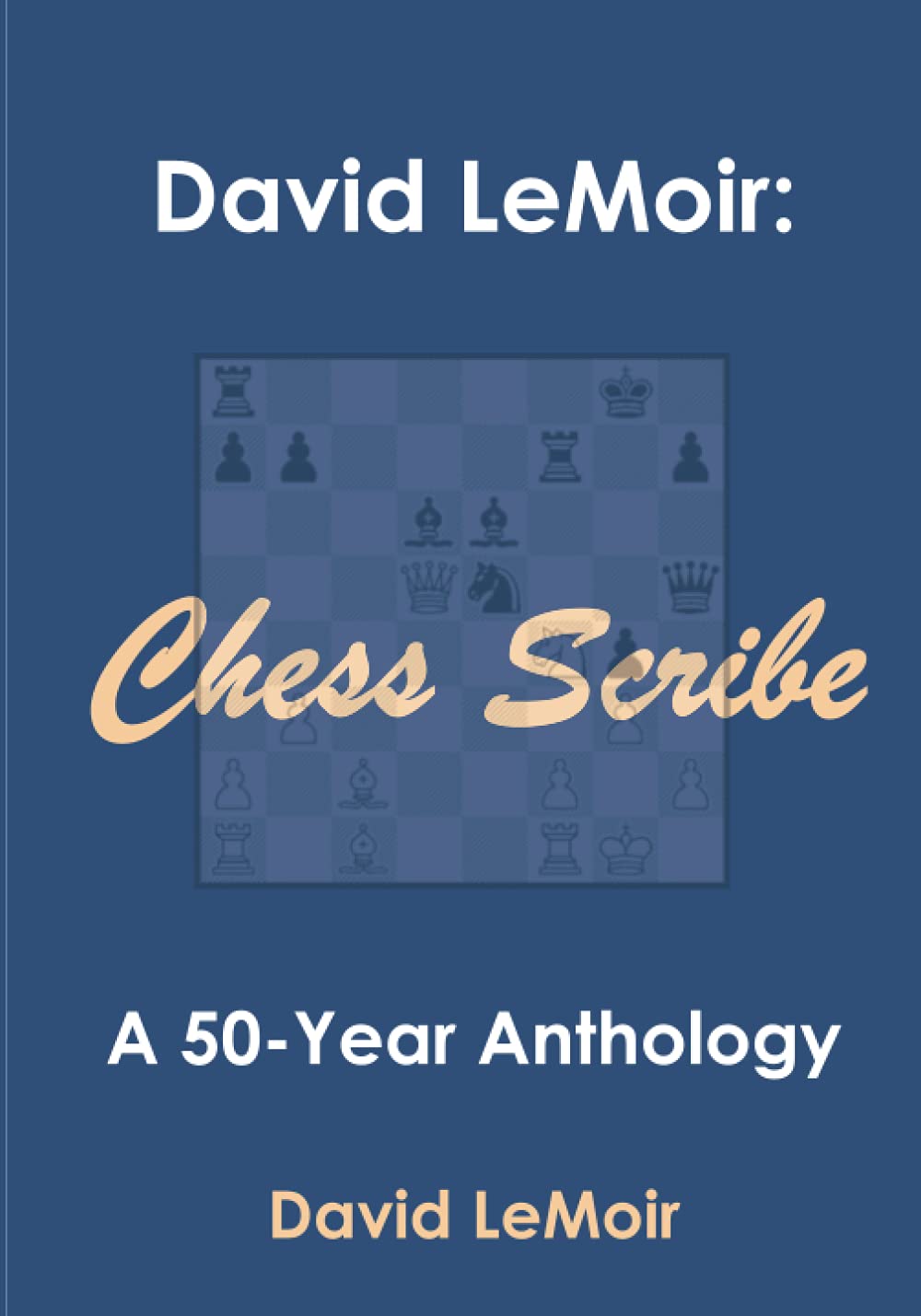
From the publisher’s blurb:
“In reviews of the author’s books, Grandmaster Matthew Sadler wrote in New In Chess about David LeMoir’s writing “… always either entertaining or instructive”, and Grandmaster Jonathan Rowson (in the English Chess Federation’s Newsletter) wrote “I like LeMoir’s writing style a lot!”.
David LeMoir has written three popular and highly acclaimed chess books: How to Be Lucky In Chess, which showed how to use psychology to lure your opponent into error; How To Become A Deadly Chess Tactician, a worldwide hit which helped thousands of players to see spotting and analysing tactics as their friends, not things to be feared or shied away from; and Essential Chess Sacrifices, which made learning each of the fifteen most common piece sacrifices as easy and effective as learning a chess opening variation.
He has also become one of the UK’s most popular chess feature writers, his work having appeared in a number of national and regional magazines. Much of his work helps his readers to understand tactics and combinations in new ways, making it easier for them to spot such opportunities in their own games. This book brings together all of his articles for national magazines, a selection of articles from regional magazines plus an excerpt from each of his three previous books. Interspersed throughout are comments by the author on the trials, tribulations and motivations of the chess author. Prepare to be instructed and entertained!
Praise for Chess Scribe: “He is one of those rare talents with the necessary skill to help his readers better understand their craft… Compelling reading … Because his writing is often very funny, LeMoir’s ideas tend to stick in the memory” – Ben Graff in CHESS Magazine. “Now… a new audience can read his witty, clever and instructional articles… a glorious collection of chess articles that will keep you entertained and help to improve your rating” – IM Gary Lane in the English Chess Federation’s Newsletter.”

Before going further you might wish to Look Inside.
Christmas 1964. In Twickenham 14-year-old Richard receives a year’s subscription to British Chess Magazine. And in Bristol, 14-year-old David receives a year’s subscription to CHESS.
We both got hooked on reading about chess, and in time both became chess writers ourselves. While I was attracted to DJ Morgan’s Quotes and Queries column, David LeMoir was attracted to brilliant attacks and sacrifices. So, while I wrote about chess trivia, David wrote about tactics.
While we have a lot in common, the main difference between us is that he’s always been a much better player than me.
This, he tells us, was his lockdown project. A collection of his chess writings over half a century. You’ll find extracts from his three books, articles from CHESS and British Chess Magazine (some of you will have read some of these before) along with articles from local publications, most notably En Passant, a magazine from Norfolk, where David has lived since 1997, all interspersed with snippets of chess autobiography.
The articles cover a wide range of topics: David’s own games, tactical and sacrificial ideas, match and tournament reports, pen-pictures of other Norfolk players and much else. There’s plenty of variety here.
What you won’t get is a lot of opening theory: David often prefers less orthodox openings. You won’t get a lot of endings either: the games David demonstrates, whether his own or played by others, are usually decided in the middle game.
You will get a lot of open, attacking play with clear and informative explanations, which will inspire you to improve your tactical skills. Rapid development and open lines are often the order of the day. Bear in mind, though, that many of the articles were written in the pre-engine age, or when engines were much weaker than they are now. The author has, sensibly, I think, chosen not to rewrite his articles to reflect this.
David must be particularly fond of this early effort, which appears several times in different guises. (Click on a move on any game in this review and a board will magically appear enabling you to play through the game.)
I particularly enjoyed this game from a Norfolk club match. White outmanoeuvred his opponent, who then, with admirable imagination and presence of mind decided to sacrifice two pieces, leading to unfathomable (at least to humans) complications.
White’s choice of 31. fxe5 lost, but David LeMoir analyses three alternatives, Nxg4, Qf1 and Nb2, all of which he claims, correctly, lead to a draw. My spoilsport computer tells me White had a clear win with 31. Rd1, and that the improbable 31. Ke2 would also have given White some advantage. A fascinating position – and just the sort of chess David likes. There are important lessons here as well about randomising the position when you’re in trouble and not being scared of complications.
Two of the sections that appealed to me most concerned the author’s Norfolk chess friends Owen Hindle and Mike Read.
Hindle is almost forgotten now, but for a short period in the mid sixties he was one of England’s strongest players before chess took a back seat to married life.
This game will be of interest to two of my online friends.
Mike Read overcame serious health problems to become a Senior International Master of correspondence chess. It’s well worth studying his games: you can find out more by visiting his website.
While we’re exact contemporaries, David and I have never met, although we may well have been in the same room at the same time on various occasions in the 1970s. I might possibly have witnessed this game from a Thames Valley League match against a Richmond & Twickenham team (possibly, given his opponent, Richmond B).
The same story as in so many games in this book: a sacrifice for open lines and rapid development. This book will teach you a lot about attacking chess.
One of David’s favourite openings is the Latvian Gambit: it’s amusing to learn that, paradoxically, it’s often a good way to score a quick draw as opponents will choose a safe and dull continuation to avoid theory. Again, perhaps a lesson there, although I’m not sure whether the lesson is ‘playing sharp but dubious openings can often pay off’ or ‘make sure you’re aware of the refutation of any sharp but dubious opening your opponent might play’.
Finally, a game which was both David’s best game and worst nightmare.
There’s a lot to enjoy, and a lot to inspire you in this book. David LeMoir is an excellent writer who values clarity of expression, and the tension and excitement of club and tournament chess really come across well. It’s a collection of articles rather than a coherent book so there’s a certain amount of repetition, and production values are not quite at the level you’d expect from a professional publishing house. There are some notation and spelling errors (he’s Graeme, not Graham Buckley, and it’s Middlesbrough, not Middlesborough, for example, but this is to be expected and won’t spoil your pleasure.
As David explains, self-publishing using Amazon is a free and easy way to get into print, although you may not sell many copies.
Books of this nature should, I think, be supported. If you buy it you won’t be disappointed.
Richard James, Twickenham 3rd December 2021

You may purchase this book from here
Book Details :
- Softcover: 272 pages
- Publisher: David LeMoir Publishing (10 April 2021)
- Language: English
- ISBN-10:1527291189
- ISBN-13:978-1527291188
- Product Dimensions: 17.78 x 1.57 x 25.4 cm
Official web site of Amazon Publishing

